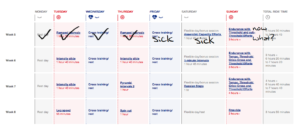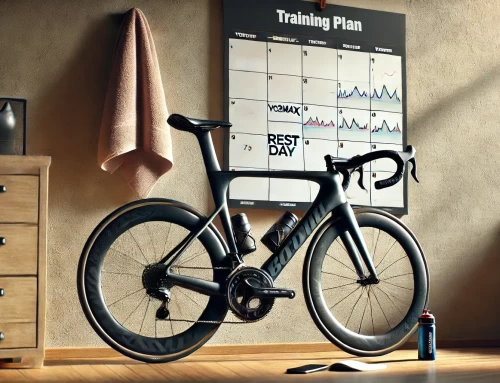Training isn’t easy, but choosing the right ‘training plan’ is even harder. Here are 5 rules you’ve probably broken, and what you can do now to be better next season.
#1 Don’t plan with hours, plan with Strain
Intuitively, we all know that every hour of training is NOT created equal. For example, if your training includes a lot of hard efforts one week, you could see a big spike in Strain even as your hours that week decline from the previous week. So why do so many athletes build, or follow, a plan based on hours?
 The first step to getting this right is to understand ‘Strain’. At it’s most basic, it’s a measure of the work performed during an activity. The rate of Strain increases as you near your Maximum Power Available at any given moment, so harder work results in greater Strain (told ya, it’s intuitive!). Strain can be tracked over any length of time from one second, to many years.
The first step to getting this right is to understand ‘Strain’. At it’s most basic, it’s a measure of the work performed during an activity. The rate of Strain increases as you near your Maximum Power Available at any given moment, so harder work results in greater Strain (told ya, it’s intuitive!). Strain can be tracked over any length of time from one second, to many years.
When training, use a system like Xert than plans and tracks training based on Strain, and follow a ‘Ramp Rate’ (increasing or declining weekly Strain) that you can sustain. A progressive training plan will also help you avoid ‘overtraining’ and injury. Did you know you can track your Ramp Rate on your Fitness Planner > Weekly Stats page?
#2 Don’t be a slave to your plan
Leave room for ‘unstructured’ training like group rides and runs, or risk burn-out. It’s a long season, and the motivation to continue training is fundamental to being able to progress.

Don’t be afraid to add ‘free rides’ to your schedule from time to time (at least once a week). If you don’t, you should be afraid of burn-out. Very afraid.
Most importantly, don’t forget that free rides are workouts & training too. Ignoring how much Strain they produce is a sure way to overtrain. With Xert, every activity is tracked, and better yet – it’s analyzed to understand how it fits into your progressive plan.
#3 Understand the demands of your goal event/race
Is your goal to reach the top of your local climb first on your weekend club ride, complete your first Century, or just to get more fit? Each of these goals requires a different set of demands.
The 2 most important facts needed to understand the demands of an event are Strain (which accounts for time and intensity) and Focus. Discover these by looking at the same activity in a previous year, or a more recent similar activity, and then select an ‘Athlete Type’ with a similar Focus.
#4 Give yourself time
Don’t pick a plan 6 weeks from your goal, that’s a recipe for disaster. Your body needs time to adapt, and that means you need to progressively apply stress, and allow time for recovery. Some adaptations – like building endurance and your Threshold Power ‘from below’ – come slowly, but you recover from these activities quickly (which means that, done right, they can be done often). However, the body adapts to high intensity training very quickly, but you recover from them more slowly. All of these adaptations come when you add stress & strain progressively by choosing, and training according to, an Improvement Rate (rate of increase in strain each week).
When you choose an Improvement Rate you’re instantly told how many hours, on average, that you’ll need to train, and it will tell you how much you’ll improve by the time you reach your goal date. If you’d like to improve more, increase your improvement rate. If you don’t have that much time to train, decrease it. If anything changes mid-plan, you can change your Improvement rate at any time.
#5 Choose a plan adapts to you as much as you adapt to it
No one ever executes a training plan perfectly. No one ever has, because life happens. Sick days, snow days, work days…you name it, they can’t be avoided. Even professional athletes have to adapt their plans to fit around whatever life throws at them.

Your plan in Xert will adapt to missed days, double-days, new goals, and changing fitness on-the-fly to help you meet your goals, no matter what life does to get in the way. So don’t plan to far ahead; Xert has a macro plan in place for you and it’s updated every time you sync a new activity.







